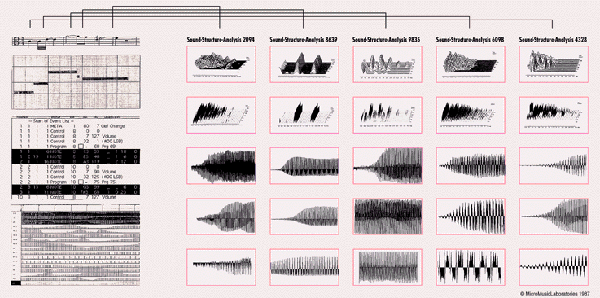|
At that time,
this practical task of music was simultaneously a religious, ideological,
ethical and purely artistic one.
Pythagoras now aroused in this ethically shaped musical work the idea
of modern scientific thinking by starting to objectivise the musical
parameters which had so far only been defined religiously, philosophically
or artistically – with measurements and numbers. He began to measure
music and/or elements of music in terms of mathematics and physics.
For the religious, philosophical, ethical and artistic leaders of that
time, this was an enormously revolutionary act which threatened to turn
their previous conception of the world upside down – and so it
was not a coincidence that Pythagoras got caught in an increasing whirlpool
of religious, political, philosophical and artistic dispute and finally
even in ideological persecution – for which, with the help of musicological
research and the help of physics and mathematics, he prepared to capture
the mentioned areas of life: religion, ethics, philosophy and art in
an exact knowledge of scientific character, and to thereby demystify
them – which, of course, was also linked to a loss of the previous
power that the contemporary leaders of social life had.
Pythagoras had verified the natural point of contact of creation between
the subjective and objective world in the microcosm of music: between
our inner world with our religious, ethical, moral, philosophical and
ideological ideas, but also with our talent, with our innate inner traits
and abilities on one hand – and the rational world of mathematics,
physics, chemistry and biology as well as astronomy on the other hand.
And he wanted to use this microcosm of music to firmly weld together
the outer and inner world of man as well as the sciences naturally resulting
from this.
And in his famous school for the training of young physicians, scientists
and artists he therefore logically taught on one hand:
– the intuitive spontaneous inner realisation of the natural laws
of harmony of the creator in the microcosm of music of the inner mental
imaginative space, meaning in the area of musical intuition or musical
creative thinking and feeling, as well as on the other hand:
– the outer empirical: the scientific realisation of the natural
laws of harmony of the microcosm of music with the help of his famous
“Monochord”, the mathematical and physical investigation of
the microcosm of music and its harmonical connection to other scientific
fields of knowledge such as medicine, biology, physics and astronomy.
This complex research and teaching work of Pythagoras was directed beyond
the aspect of health at the realisation of a standardised field of life
and creation, and therefore at the development of a unified field theory,
something our modern science also strives for – but contrary to
this, Pythagoras, at the same time, included the great areas of religion,
ethics, psychology, sociology and art, as well as medicine in this whole
process of integrated, subjective and objective achievement of knowledge:
so he combined the arts intuitive and the scientific objective verifying
achievement of realisation with each other, in order to advance to a
holistic, standardised view of the inner and outer world, shaped by
natural harmony.
On this integrated basis, he wanted to ensure the holistic systematical
development of natural human dignity and the protection of life as well
as the ecology.
However, before Pythagoras was able to work out such a natural system
of holistic health maintenance, which was supposed to find equal application
for all human beings – as we, for instance, try to do with tablets
nowadays –, his place of training was destroyed, for as a forward-looking
philosopher with a strong personal charisma, he was too dangerous in
the eyes of the ruling dictators.
|
Some report
that Pythagoras, after several attempts on his life and work, finally
died in the course of an arson attack somewhere in Italy – others
report that he also survived this attack and was able to escape.
However it may be, there remains the famous monument of a man who
was about to discover and objectivise the natural laws of harmony
of life with the help of intuition and scientific research, and to
turn them to use in all areas of practical life – and especially
in the area of the individual's health.
So, as a composer, I today fall back on the thinking and the work
of this great scholar of our ancient history.
In my musicological studies of an intuitive and scientific kind, as
a sound creator I solely start from the assumption of that simple
thesis of this universal scholar in which he postulated that the natural
laws of harmony of the microcosm of music, of the human soul, biological
life and of the cosmos were identical.
If this statement of Pythagoras is right – it was later endorsed
by quite a number of famous scholars -, then it seems to me, above
all, important today to make accessible to the individual listener,
with the help of music, these natural laws of harmony of his life
and creation as we find them intuitively and with the help of outer
studies in the microcosm of music, by structuring my musical work
according to the natural laws of harmony of the microcosm of music
– which by no means inhibits me in my artistic freedom, but rather
has an inspiring influence.
And the studies and clinical observations with the Medical Resonance
Therapy Music® carried out by Professor Reznikov and
his research team clearly show – that is my opinion – that
a joint pursuit on the path of the research and development of the
natural laws of harmony of the microcosm of music presents an important
contribution to the development of holistic medicine. I would like
to invite you all to collaborate.
|
